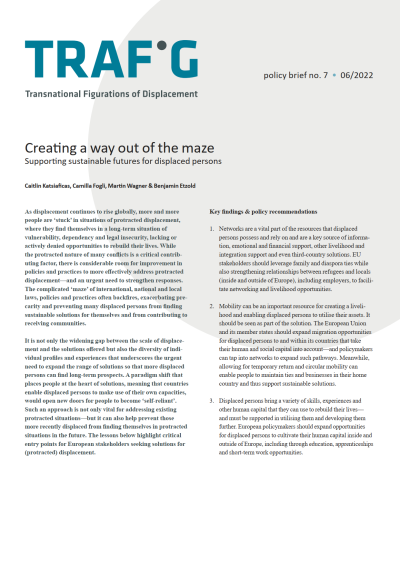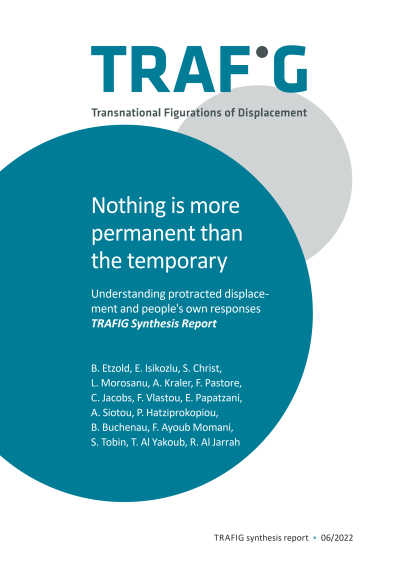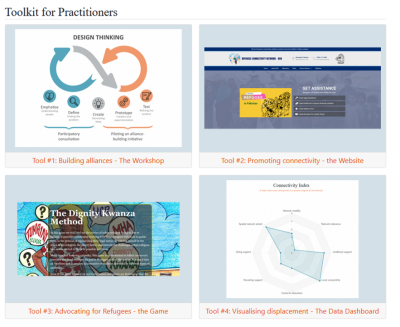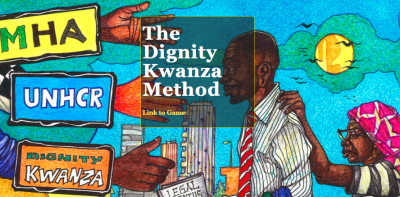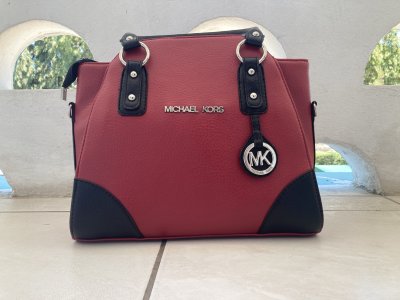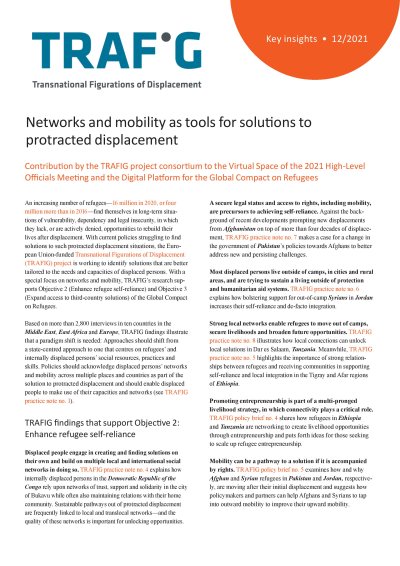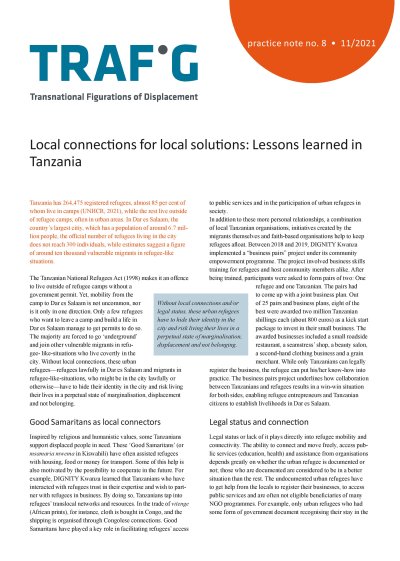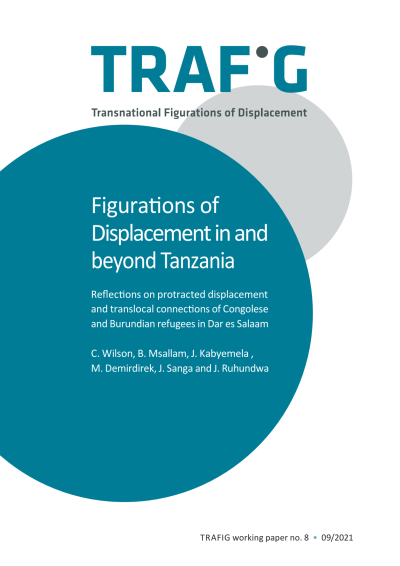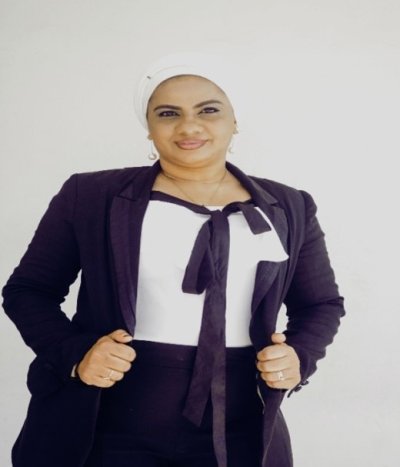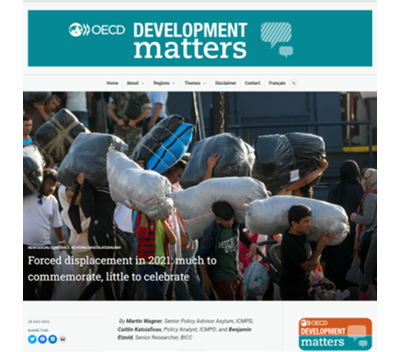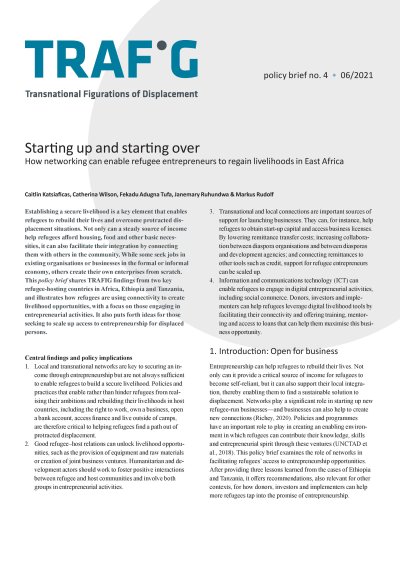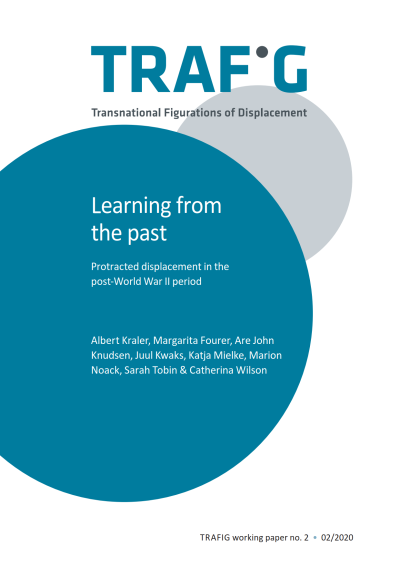Tanzania
Practitioners from Dignity Kwanza – Community Solutions and researchers from Leiden University collaborated in their study of Congolese and Burundian refugees in Dar es Salaam. The Tanzanian case study is based on the stories and experiences of over 80 people.
TRAFIG practice note no. 12
In the shoes of a Congolese refugee:
Online game helps to understand urban refugees' legal struggles
The TRAFIG team developed an interactive story-based online simulation to sensitise practitioners and the public to the multiple challenges urban refugees in Dar es Salaam face. Feedback workshops with refugees, government officials and other local stakeholders in Tanzania and with scholars and students in the Netherlands helped to refine the game and draw key lessons from the method.
TRAFIG practice note no. 12 presents the online game and the lessons learned from three feedback workshops. You can download it here.
More information on the game is available in our TRAFIG toolkit section.
Authors: Janemary Ruhundwa (Dignity Kwanza), Jochem Scheelings (Leiden University / Value... Read more
TRAFIG policy brief no. 7
Creating a way out of the maze: Supporting sustainable futures for displaced persons
As displacement continues to rise globally, more and more people are ‘stuck’ in situations of protracted displacement, where they find themselves in a long-term situation of vulnerability, dependency and legal insecurity, lacking or actively denied opportunities to rebuild their lives. Drawing lessons from more than 3 years of research, this policy brief highlights critical entry points for European stakeholders seeking solutions for (protracted) displacement. Read more
TRAFIG Synthesis report
'Nothing is more permanent than the temporary' – Understanding protracted displacement and people's own responses
Final report sums up findings of 3 1/2 years of TRAFIG research.
Across the world, 16 million refugees and an unknown number of internally displaced persons (IDPs) experience long-lasting conditions of economic precarity, marginalization, rightlessness and future uncertainty. They live under conditions of protracted displacement. Policy solutions often fail to recognise displaced people’s needs and limit rather than widen the range of available solutions.
This report brings together the central findings of the TRAFIG project’s empirical study in the Democratic Republic of the Congo (DRC), Ethiopia, Tanzania, Jordan, Pakistan, Greece, Italy and Germany. We... Read more
Toolkit for Practitioners: Building Webs of Connections
This toolkit brings together practical outputs on solutions to protracted displacement.
Practitioners can promote or support displaced people's connectivity. Helping to build a web of connections allows displaced people to move ahead in life and to belong to others.
The toolkit entails 4 examples from our work:
Tool #1: Building alliances - The Workshop
Tool #2: Promoting connectivity - the Website
Tool #3: Advocating for Refugees - the Game
Tool #4: Visualising displacement - The Data Dashboard
Learn more about these tools, how we developed them and used them in our work. Read more
The DIGNITY Kwanza Method
Online game developed by the TRAFIG team
Based on their joint empirical study in Tanzania, colleagues from Leiden University, Dignity Kwanza-Community Solutions and the VALUE foundation developed an online game to inform users about the lives and daily challenges of urban refugees in Tanzania.
The DIGNITY Kwanza Method is an online, interactive story-based simulation. It asks users to play the role of an advisor at DIGNITY Kwanza, a refugee advocacy NGO based in Dar Es Salaam (Tanzania). Users must critically reflect on the experiences of three fictional Congolese refugees who find themselves in a situation of limbo in the city and at a critical juncture of their lives. Should they return to their insecure country of origin or remain in Dar es Salaam without a legal status? The... Read more
TRAFIG at the “In Dialogue” Symposium organised by Indiana University
On 18/19 March 2022, colleagues involved in the TRAFIG project contribute to Indiana University’s “In Dialogue” Symposium, which focusses on transnational dynamics and repercussions of the movement of displaced peoples between Africa and Europe. In a session on “Constrained transnationalism: Experiences of displacement and ongoing limbo between Africa and Europe” Catherina Wilson (Leiden University), Janemary Ruhundwa (Dignity Kwanza), Benjamin Etzold (BICC), Markus Rudolf (BICC), Simone Christ (formerly BICC) and Pietro Cingolani (FIERI) will share insights from TRAFIG research in Tanzania, Ethiopia, Italy, the Netherlands and Germany.
Stakeholder workshop in Tanzania
In order to provide a platform for local discussion on protracted displacement in Tanzania, a stakeholder workshop was organized in Dar es Salaam on 18 and 19 November 2021 by DIGNITY Kwanza in partnership with Leiden University and BICC.
The workshop’s overall aim was to share insights into how connectivity and mobility can help to redesign (policy) solutions for protracted displacement - and to create a space for open discussion in which different stakeholders could share their experiences and views. Read more
All for a Bag!
By Catherina Wilson (Leiden University)
Letting it be: Congolese in The Netherlands
On a cold, winter afternoon in early 2021, I visited Philo (all names have been anonymized), a Congolese lady, at her place. We had been introduced by an acquaintance a couple of months before. Around the same time, I was to start research on Congolese migrants in The Netherlands and I was eager to interview Philo for this purpose. During previous encounters, she had shown interest in participating. Read more
Networks and mobility as tools for solutions to protracted displacement
Contribution by the TRAFIG project consortium to the Virtual Space of the 2021 High-Level Officials Meeting and the Digital Platform for the Global Compact on Refugees
An increasing number of refugees – 16 million in 2020, or 4 million more than in 2016 – find themselves in long-term situations of vulnerability, dependency and legal insecurity, in which they lack, or are actively denied, opportunities to rebuild their lives after displacement. With current policies struggling to find solutions to such protracted displacement situations, TRAFIG is working to identify solutions that are better tailored to the needs and capacities of displaced persons. With a special focus on networks and mobility, TRAFIG’s research supports Objective 2 (Enhance refugee self-reliance) and Objective 3 (... Read more
TRAFIG practice note no. 8
Local connections for local solutions: Lessons learned in Tanzania
Available in English and Swahili
Dar es Salaam is Tanzania’s largest city with a population of around 6.7 million people. Amongst them are approximately ten thousand vulnerable migrants who find themselves in refugee-like situations. Most of these vulnerable migrants are forced to live ‘underground’ because they do not have a government-issued permit to live outside of refugee camps. They nevertheless take their chances to build a productive life in the city, even if they must live covertly.
In these situations, local connections are crucial: Without local connections and/or legal status, these urban refugees have to hide their identity in the city and risk living their lives in a perpetual state of marginalisation, ... Read more
TRAFIG working paper no. 8
Figurations of Displacement in and beyond Tanzania
Reflections on protracted displacement and translocal connections of Congolese and Burundian refugees in Dar es Salaam
This working paper investigates the livelihoods, trajectories, networks and self-generated opportunities of vulnerable migrants in refugee-like situations in Dar es Salaam. Its main purpose is to arrive at a deeper understanding of protracted displacement through a ‘figurational approach’, which stresses the networks and the interdependencies of urban refugees in Dar es Salaam, across Tanzania, and across national borders.
Refugees’ social relations do not unfold in a vacuum but are shaped by the regimes of aid and asylum that govern their lives. In a context of constant fear of imprisonment and deportation, this... Read more
Meet TRAFIG Team member Bishara Msallam
I wish I could do more
Meet Bishara Msallam - Program Officer (Legal and Community Empowerment) at DIGNITY Kwanza - and find out more about her experience, her motivation and her work in the TRAFIG project.
I am Bishara Msallam, an advocate working with DIGNITY Kwanza, a Tanzanian NGO that is mandated to safeguard and promote the human dignity of refugees and other marginalized populations for the attainment of their social and economic development. Through legal services, community empowerment programs and advocacy, DIGNITY Kwanza contributes to the efforts to create and foster a refugee regime that effectively responds to the needs of refugees, host government and host community.
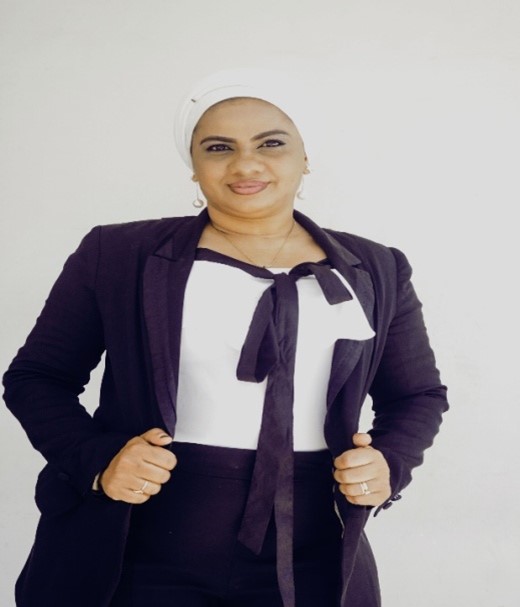
Photo: Bishara Msallam
I have been performing my duties as legal counsel, sitting behind my d... Read more
Forced displacement in 2021: much to commemorate, little to celebrate
Published in the OECD Blog series 'Development matters'
It is primarily the responsibility of states to provide durable solutions to people in protracted displacement. A state-centred approach, however, risk underestimating or even disregarding the ambitions and capacities of displaced people themselves. In a contribution to the OECD blog series ‘Development matters’ Martin Wagner and Caitlin Katsiaficas (both ICMPD) and Benjamin Etzold (BICC) present some insights on TRAFIG research on the mobility of displaced people in the Middle East and East Africa and the role of networks in their everyday lives. They conclude that many refugees rely first and foremost on their own human, social and financial capital to build a more secure future.
Find the article here: Forced displaceme... Read more
TRAFIG policy brief no. 4
Starting up and starting over
How networking can enable refugee entrepreneurs to regain livelihoods in East Africa
Establishing a secure livelihood is a key element that enables refugees to rebuild their lives and overcome protracted dis placement situations. Not only can a steady source of income help refugees afford housing, food and other basic neces sities, it can also facilitate their integration by connecting them with others in the community. While some seek jobs in existing organisations or businesses in the formal or informal economy, others create their own enterprises from scratch.
This policy brief shares TRAFIG findings from two key refugee-hosting countries in Africa, Ethiopia and Tanzania, and illustrates how refugees are using connectivity to create livelihood oppor... Read more
TRAFIG working paper no. 2
Learning from the past
Protracted displacement in the post-World War II period
This working paper examines the history of the search for solutions to protracted displacement. Focusing specifically on the Horn of Africa, East Africa, the Middle East and South Asia, the paper analyses past policy responses that explicitly or implicitly address situations of extended exile. In addition, the paper examines the potential of translocal mobility and connectivity as an individual- or household-level solution to displacement.
The concern to find solutions for long-term displacement situations has been a key driver for the evolution of the international refugee protection regime ever since its initiation in the interwar period. Yet, only more recently have these efforts crystallised around... Read more


